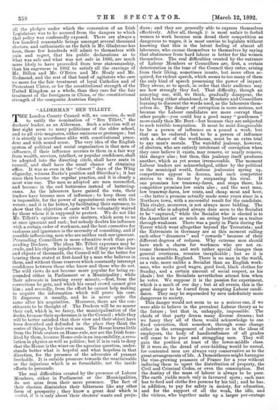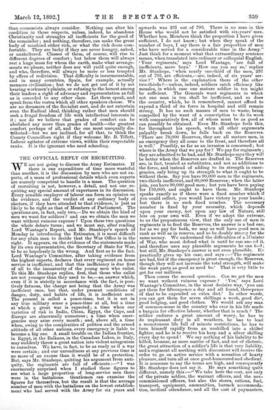"ALDERMAN" BEN TILLETT. T HE London County Council will, we conceive,
do well to ratify the nomination of "Ben Tillett," the dockers' leader, as an Alderman. Such a selection will at first sight seem to many politicians of the older school, and to all civic magnates, either ominous or grotesque ; but it is strictly in accordance alike with constitutional prece- dent and with sound sense. The very idea of the English system of political and social organisation is that men of influence, if their influence accrues to them in a fair way from wealth, services, intellect, or popular confidence, shall be adopted into the directing circle, shall have seats in council, and shall have the usual chance of obtaining office. It was so even in the " closest " days of the Whig oligarchy, witness Burke's position and Sheridan's ; it has since then become the regular practice, and it is clearly a most wise one. The men so adopted are men reconciled, and become in the end buttresses instead of battering- rams. As the labourers have gained the vote, their leaders have become men of influence ; to keep them out is impossible, for the power of appointment rests with the voters ; and it is far better, by facilitating their entrance, to show that the objection of caste will be voluntarily waived by those whom it is supposed to protect. We do not like Mr. Tillett's opinions on civic matters, which seem to us at once ignorant and rash ; but nobody doubts his influence with a certain order of workmen, and the best corrective for rashness and ignorance is the necessity of consulting, and if possible influencing, men who are neither rash nor ignorant. Persuading Councillors is more educative work than per- suading Dockers. The ideas Mr. Tillett expresses may be crude, and his objects injudicious ; but if they are the ideas and objects of thousands, the Council will be the better for hearing them stated at first-hand by a man who believes in them, and without those reserves which constantly intercept confidence between those who know and those who do not. The wild views do not become more popular for being ex- pounded either in Parliament or a Municipality ; while their advocate is learning every minute,—first, from the corrections he gets, and which his usual crowd cannot give him ; and secondly, from the effort he cannot help making to acquire the information which will prove his case. It disproves it usually, and he is never quite the same after his acquisition. Moreover, there are the con- stituents to be thought of. The Dockers will be no nearer their end, which is, we fancy, the municipalisation of the docks, because their spokesman is in the Council ; while they will be better satisfied that their view and their object have been described and defended in the place they think the centre of things, by their own man. The House learns little from the Irish orators on Home-rule, nor are the Irish bene- fited by them, because Home-rule is an impossibility, a, revo- lution in physics as well as politics ; but it is in vain to deny that the House is the wiser on the agrarian question, under- stands better what is hopeful and what hopeless in that direction, for the presence of the advocates of peasant freeholds. It is outside pressure towards the unattainable or the injurious which is so formidable, not the inside efforts to persuade.
The real difficulties created by the presence of Labour Members, either in Parliament or the Municipalities, do not arise from their mere presence. The fact of their election diminishes their bitterness like any other form of prosperity ; they know a great deal which is useful, if it is only about their electors' wants and preju- dices ; and they are generally able to express themselves effectively. After all, though it is most unfair to forbid women to work because men dread their competition as dangerous to wages, it is most unwise to legislate without knowing that this is the latent feeling of almost all labourers, who excuse themselves to themselves by saying that abstinence from hard labour is better for the women themselves. The real difficulties created by the entrance of Labour Members or Councillors are, first, a certain deterioration in the tone of the Council they enter, arising from their liking, sometimes innate, but more often ac- quired, for violent speech, which seems to too many of them the only kind of speech possessing the power of impact. They swear, so to speak, in order that their audience may see how strongly they feel. That difficulty, though an annoying one, will, we think, gradually disappear, the habit being either abandoned, or Members and Councillors learning to discount the words used, as the labourers them- selves do. The danger of corruption is more serious, not because the Labour candidates are more corrupt than other people—you could buy a good many " gentlemen " more easily than Mr. Burt—but because they are subjected to such terrible temptation. It must be most disagreeable to be a person of influence on a pound a week, but that can be endured ; but to be a person of influence with a chance of the workhouse, must be an extra trial to any man's morals. The watchful jealousy, however, of electors, who are entirely intolerant of corruption when they once believe it exists, may remove, or nearly remove, this danger also; but then, this jealousy itself produces another, which as yet seems immoveable. The moment Labour leaders are acknowledged, either by the political or the municipal world, furious jealousies spring up, competitors appear in dozens, and each competitor strives to win favour by surpassing his rival. If one promises low tramway-fares, and stops there, his competitor promises low rents also ; and the next man, low tramway-fares, low rents, and cheap meat and beer, —the latter a promise actually made some years since in a Northern town, with a successful result for the candidate. This rivalry, moreover, is not always mere bidding. The Radical who is adopted always does seem to the Socialist to be "captured," while the Socialist who is elected is to the Anarchist not so much an erring brother as a traitor through weakness. There was a party in Paris during the Terror which went altogether beyond the Terrorists ; and the Extremists in Germany are at this moment calling each other " dreamers " and " cowards " because of their different degrees of redness. Why extreme men should have such a charm for workmen who are not ex- treme themselves, and seek rather special changes than general overturns, remains inexplicable ; but so it is even in sensible England. There is no man in the world, as a rule, more unlike a Socialist than an English work- man, who seeks good wages, good food, black clothes for Sunday, and a certain amount of social respect, as his ideals ; but the Socialists nevertheless attract him when he votes. We suppose it is the passion for experiment, which is a mark of our day ; but at all events, this is the great danger to be feared from accepting Labour candi- dates. They may be superseded by men indefinitely more dangerous to society.
This danger would not seem to us a serious one, if we were able to believe in the prevalent Labour theory as to the future ; but that is, unhappily, impossible. The chiefs of that party dream many &verse dreams • but we fancy they all of them would acknowledge to one fixed conviction, that somehow, through some change either in the arrangement of industry or in the ideas of employers, the body of handicraftsmen of all grades will cease to be poor and struggling men. They will gain the position at least of the lower-middle class. If it *ere so, the dread of over-bidding would be unreal, for contented men are always very conservative as to the great arrangements of life. A Demosthenes might harangue the vine-growing peasants of France for a year without inducing them to upset the distribution of property, the Civil and Criminal Codes, or even the conscription. But the destiny of the mass of labour is always to be poor. The earth yields much only in favoured spots ; each man has to feed and clothe five persons by his toil ; and he has, in addition, to pay for safety in society, for education, and for the support of all the weak, the idle, and the vicious, who together make up a larger per-centage than economists always consider. Nothing can alter his condition in those respects, unless, indeed, he abandons Christianity and. strangles all inefficients for the good. of the remainder ; and nothing, therefore, can make the great body of mankind either rich, or what the rich deem com- fortable. They are lucky if they are never hungry, naked, or unsheltered. Classes of them, of course, will rise to different degrees of comfort ; but below them will always rest a huge mass for whom the earth, make what arrange- ments we please, neither does nor will yield quite enough, and who, therefore, will always be more or less tempted by offers of redivision. That difficulty is insurmountable, and in many countries, Spain, for example, actually menaces civilisation; but we do not get out of it by not hearing workmen's plaints, or refusing to the honest among their leaders a right of advocacy and representation as full as is conceded to any other class. Let them speak, and speak from the rostra which all other speakers choose. We are no dreamers of the Socialist sort, and do not entertain even the Radical ideal, thinking rather that men should seek a frugal freedom of life with intellectual interests in it ; nor do we believe that grades of comfort can be abolished any more than grades of health—the greatest comfort perhaps of all, and the one most unequally dis- tributed—but we are inclined, for all that, to think the County Councillors right if they welcome Mr. B. Tillett, Labour agitator of extreme views, within their respectable ranks. It is the ignorant who need schooling.



































 Previous page
Previous page